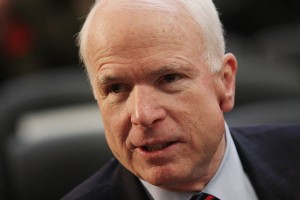 U.S. Sen. John McCain said today the crisis in Syria had reached a “a decisive point” and called on the United States to lead an international effort to begin airstrikes on Syria.
U.S. Sen. John McCain said today the crisis in Syria had reached a “a decisive point” and called on the United States to lead an international effort to begin airstrikes on Syria.
“Time is running out,” he said on the Senate floor today. “(President Bashar) Assad’s forces are on the march. Providing military assistance to the Free Syrian Army and other opposition groups is necessary, but at this late hour, that alone will not be sufficient to stop the slaughter and save innocent lives. The only realistic way to do so is with foreign air power.”
The Arizona Republican said the Syrian government’s crackdown on its political opposition has resulted in war crimes and that its neighbors in the region will intervene militarily, with or without the U.S.
McCain, who opposed Barack Obama in the 2008 presidential election, said the United States has a moral and strategic obligation to force out Assad and his loyalists.
Said McCain:
“The ultimate goal of airstrikes should be to establish and defend safe havens in Syria, especially in the north, in which opposition forces can organize and plan their political and military activities against Assad. These safe havens could serve as platforms for the delivery of humanitarian and military assistance – including weapons and ammunition, body armor and other personal protective equipment, tactical intelligence, secure communications equipment, food and water, and medical supplies. These safe havens could also help the Free Syrian Army and other armed groups in Syria to train and organize themselves into more cohesive and effective military forces, likely with the assistance of foreign partners.”
Last month, McCain urged international cooperation to help supply the anti-Assad rebels with weapons and other aid. At the time, he stopped short of endorsing direct U.S. military involvement, the Associated Press notes.
USA Today

Leave a Reply
You must be logged in to post a comment.